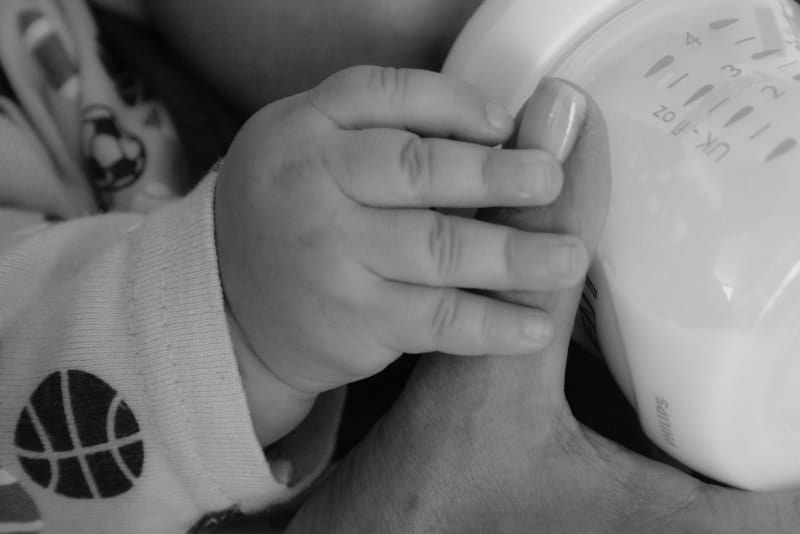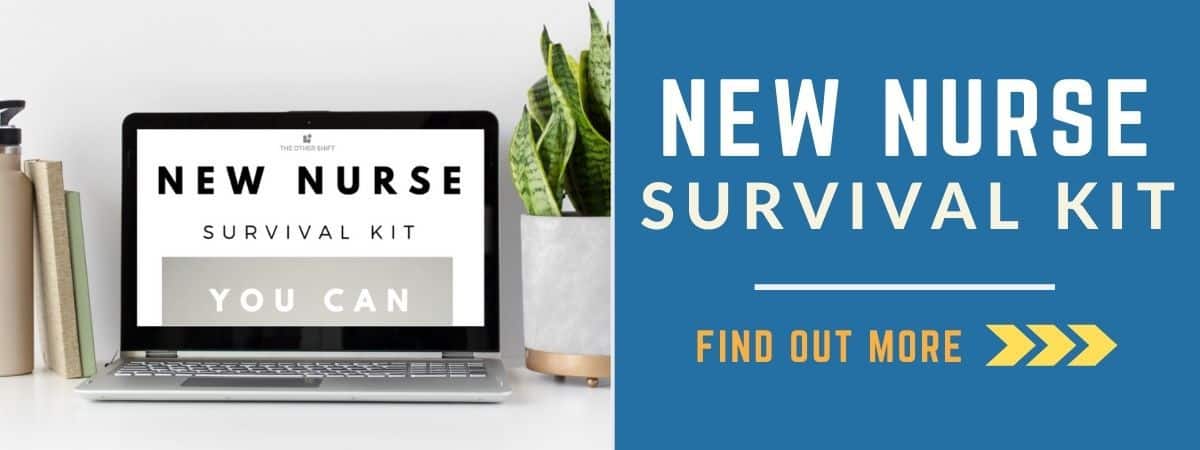Disclosure: This page may contain affiliate links, meaning we receive a commission if you decide to make a purchase through our links, but this is at no additional cost to you. Please read our disclosure and privacy statement for more info.
Any working parent knows that it is a struggle to juggle both home life and working full/part-time. But, as you know, working the night shift takes this reality to a whole new level. You’re required to work all night long, caring for the community, then coming home and working your second job, being a mom. And It’s hard.
Working as a night shift nurse with kids requires you to be transparent with your boss about your situation, get organized, rest where you can, adapt, lean on your resources for help and try to embrace the flexibility that comes with being around during the day when your kids are most active.
It may seem almost impossible, but it can be done. Like any life challenge, there are ways to mitigate it to make your life less stressful. In this article, we will discuss night shift nursing while pregnant, a few tips for postpartum and how to manage work-life while raising children. This can also be done as a single parent. You’ll learn tips on how to take care of yourself and how to balance work life and home life.
Surviving Pregnancy While Working Night shift
Here you are, you’ve figured out how to be a night shift worker. You are doing great with the schedule (well as best as you can). Life is good. Life is great actually because you just found out you are pregnant! (which I am hoping is good news)
But wait, how is this going to work with these overnight shifts? Is morning sickness going to still happen in the morning? My mornings are at 6pm! I have learned how to take care of myself while working nights— eating well and exercising. How am I going to keep that routine going if I have to also work on growing another human?
While it seems impossible, I can assure you it’s definitely not. In developing this article, we’ve connected with plenty who’ve been there and know the struggles. And lucky for you, they’ve also figured out how to conquer them.
We spoke to one busy mum in particular who provided some great insights.
She found out she was pregnant a couple of months before taking a travel assignment a few hours north of where she was living.
She thought it was actually the perfect solution; take a travel contract to make extra money right before the baby was born. She had to really mentally and physically prepare herself for what she was getting into. It was 12 hour overnight shifts. She started by researching, and developed fool-proof plan post lots of discussion with other nurse friends.The plan included: occupational concerns, tips on how to survive being pregnant while working overnight, and how to create a strategy when you get close to delivery day.

Pregnant Nurse Precautions
Depending on your specialty and what your beliefs are while pregnant, you may need to seek out additional resources, take extra preparations, or switch nursing specialties completely.
When you fall pregnant, one of the first things you’ll want to do is talk to your obstetrician and your manager about any occupational concerns you may have.
Some common work hazards nurses come across include the following:
- Radiation from diagnostic imaging
Nurses who work in ER, IR, or OR may be concerned about radiation exposure and how it could affect the baby. (source) You absolutely must wear a lead apron to protect yourself (or remove yourself from the room completely if possible).
- Working with chemotherapy or other teratogenic medications
There is some evidence that handling certain medications can cause adverse outcomes including miscarriage, birth defects, preterm births, and fetal loss. (source) Wearing the recommended personal protective equipment (PPE) is a simple strategy to minimise your risk. (source)
Nurses working in oncology can stay in the unit, but may have to make arrangements with their coworkers to give the teratogenic medications. If this becomes an issue, this is a time that you may consider switching departments.
- Risk of infections
We are all aware of the common and very contagious diseases such as c-diff, tuberculosis, cytomegalovirus, and influenza. Pregnant women need to be especially proactive with wearing PPE and hand washing. Nurses in the ER are especially at risk because often times they don’t find out they were exposed until after the patient is admitted and the test results come back positive. (source)
It’s a good idea to stay up to date on all your vaccinations and make sure you ask for assignment modifications if you feel uncomfortable caring for a specific patient. (source)
If you’re new to nursing this post may be helpful right now.

- Combative or violent patients
Violence is not uncommon, especially in the ER (at night). It is not a bad thing to be overly cautious. Keep a very close eye on your patients and watch for any red flags that may lead to a threatening situation. (source)
If you do find yourself working with a patient who is becoming violent, it is best to remove yourself from the area immediately and call for help.
- Physicality of your job
Nurses are constantly walking, bending, pulling, lifting, and squatting. Pregnant bodies change drastically throughout the pregnancy and can make it easier to injure yourself.
Practice good body mechanics at all times and ask for help often. Even if it is a task you would normally be ok doing independently (assisting a patient from a seated to a standing position), getting proper safety equipment and another person to stand by is a very good idea.
Tips on Surviving Pregnancy and Nightshift
Normal pregnancy can be exhausting. Being pregnant while having to change your sleep schedule and work while the rest of the world is sleeping is even worse. But there are ways to survive (and maybe even thrive?).
Here are eight tips on how to thrive through your pregnancy;
1. Compression Socks
You already know how much you’re on your feet while working as a nurse. Wearing compression stockings may already be something that you do. But if you are pregnant, it is even more important to wear compression socks to help with circulation, decrease swelling, and prevent achy feet and ankles.
They can also help prevent varicose veins which affect many pregnant women. Pregnant women’s bodies hold increased fluids to nurture the baby. Having free-flowing circulation is very important to prevent fluid accumulation in your tissues.
Need a pair? This post gives some great options: Should I Wear Compression Socks At Work?
2. Durable, Comfortable Shoes
Look for shoes that are comfortable, easy to wear, and breathable. You want to make sure they have extra room to accommodate potential foot swelling. Also, get a shoe that is easy to put on; bending over and struggling to put a shoe on while pregnant counts as a workout.
Related post: How to Relieve Foot and Leg Pain from Standing All Day
3. Healthy Snacks
Nutrition is extremely important for pregnant women. Working on night shift can cause GI upset and other digestive issues. Having a variety of healthy, nutrient-dense snacks available each night instead of one meal is a good idea.
Pack things like trail mix (no added sugar or salt), energy bars (again, watch the sugar), nut butter with apples, good ol’ peanut butter and jelly sandwiches, greek yogurt, string cheese, hard-boiled eggs and veggies and hummus. Also make sure to drink tons of water and try to stay away from a lot of caffeine.
Here are some other healthy snack ideas, here’s another if you’re vegan, and here’s one for the warriors!
4. Sleep
Growing a human takes a lot of energy. Sleeping should be like a second job for you. Sleep as much as you can. Aim (“aim” being the operative word here) for at least 8-9 hours of sleep each night and take as many naps as possible.
We know many people who set an alarm and take a 30 min nap on their break— it’s a lifesaver to get them through that 3-5am hump. It’s a good idea to listen to mediation podcasts or take hot showers to fall asleep easier too. Music and lavender-scented anything is also a good way to relax into a deep sleep.
Check out this one for some weird sleep tips.
To fall asleep quickly, use an eye mask. We love these two pictured below.


5. Move
I know it sounds awful because you are tired, but force yourself to do something active outside of work every day.
Exercise can help you sleep better, give you more energy, and decrease stress. All good things for pregnant mommas.
It’s not a good idea to try a new sport because you shouldn’t put yourself at risk of injury. Stick to your normal routine and make adjustments as you progress through the pregnancy. Some good ideas are walking, swimming, yoga, low impact aerobics and lifting light weights.
This video might give you the exercise inspiration you are searching for.
6. Communicate honestly with your manager
Your manager should be notified right away when you find out you are pregnant. According to the Pregnancy Discrimination Act, it is forbidden to discriminate against anyone when it comes to any aspect of employment including hiring, firing, pay, job assignments, layoff, training, etc.
Your manager should accommodate you in any way possible. Be open and honest about how you’re feeling and what you think your limitations should be. Not everyone is created equal. Also, be sure to let them know in advance all doctor’s appointments and when you are planning on going on maternity leave. If anything changes, you must give updates.
Despite your best intentions, we understand this conversation can be difficult. This post might help you out here.

7. Gain advice from your doctor
Obstetricians see all kinds of pregnant women with a variety of lifestyles. Being upfront and open about yours is extremely important for your doctor to know.
They may recognize occupational hazards that you wouldn’t think of. They can also give you tips on how to get into a good routine with your work schedule.
When spoke to someone who said their obstetrician was very helpful when it came to morning sickness (which happened to be at 5pm since that is the time most wake up during the day to get ready for work). She gave ideas for medications and supplements that helped to combat nausea for the start of the shift, which was usually the busiest time of day for a mom with a family.
Related post: Shift Work and Family. A Practical Guide For Busy Parents
8. Enjoy your pregnancy
Pregnancy comes with a lot of difficult and new experiences. (And challenges!) Your body is changing by the day, you are emotional, and you don’t feel the best most days. But, creating another human being is one of the greatest gifts.
Flaunt your baby belly and take pride in working so hard while already doing a great job helping your little one grow into a baby!
And always remember, pregnancy doesn’t last forever!
[VDIEO] – For a different perspective, here is another pregnant night shift!
Postpartum: Returning to work, pumping, and every emotion in between
You did it! You got through those incredibly hard 9 months and are blessed to have a sweet little babe to snuggle up with for some weeks before you have to go back to work.
If you need a few more tips – you’ll like this post: 7 Tips for Surviving Night Shifts Whilst Pregnant
Maternity leave varies depending on the company you work for and the country you work in. Unless you get the privilege of being a stay home mom, you will have to decide when you are ready to go back to work and what things you need to think about.
The first step is getting all your logistics in place: childcare, backup childcare, coordinating schedules (with your significant other or family members/daycares), and a plan for pumping.
It is likely going to be very difficult transitioning from mom life to working mom life.
Many moms will feel some pressure on deciding when to return to work and will also feel pressure to be at home caring for their little ones.
It can be an overwhelming and confusing time. You are going to be sleep-deprived and may feel a lack of motivation, concentration problems, maybe even a little anxiety or depression can develop. It is important to do your best to develop a support system of people you trust and can depend on. All you can do is take it one day at a time.
How to Make the Transition Easier To Work
First and foremost, stay focused on the present. Do your best to not worry about what is going to happen later in the day, week or even year. Your emotions will probably be changing by the hour which is normal, but maintaining your composure and focusing on what is happening at that time will help you survive these tough few weeks away from your baby.
Secondly, if you can, get your baby on a sleep schedule before you go back to work. This will help you and the caretaker of your child. There are many resources online or you can talk to your pediatrician on how to create the best sleep schedule for you and baby. Getting into a solid routine will help everyone get back to a normal rhythm.
Thirdly, do your best to take care of yourself. You just birthed a baby, possibly one of the hardest things your body will do. Proper nutrition, exercise, and reducing stress is key to healing and will help your ability to cope with all the changes.
Gradually get back into your exercise routine and drink plenty of water. If you are realizing you cannot manage life as a working mom of a newborn, reach out to your doctor immediately— especially if you are noticing symptoms of postpartum depression. They will assist you with treatment options.
Other related posts which might be helpful;
- The Complete Guide to Managing Night Shift with a Newborn
- Husband Works Night Shift: What Every Couple Should Know
- Work from Home Night Shift Jobs: A Must Read Before Applying
Pumping and Night Shift
For you breastfeeding moms, the thought of working overnight and being away from your baby can be very scary. You won’t have the luxury of breastfeeding your baby at night, but you must keep the milk flowing if you want to continue to breastfeed.
It is especially troubling on night shift when you don’t have the amount of staff day shift does and you do not know when you will get a break.
Just a couple of tips to keep in mind to make things go as smooth as possible:
- Tell your manager, charge nurse, and coworkers that you need to pump— plain and simple, it has to happen.
- Pump whenever you get a free moment, even if its only ten minutes. Most nurses will pump on their lunch break.
- Use a hands free breast pump. This will allow you to pump while simultaneously doing another task (like charting or eating). You can also pump to and from work if the drive is long enough.
- Try to keep the same schedule at work that you did at home if your work flow allows.
- This hands free pumping bra is hugely popular on Amazon. Makes eating and pumping on your break easier.
Employers are required to provide break time and a space to pump as frequently as needed by the nursing mother for up to one year according to the U.S. Department of Labor.

Continue Being a Great Parent While Working Night Shift
Every situation is different, but the most common trait of all night shift nurse mommas is how to make life as liveable and fulfilling as possible. You don’t want to miss out on anything. You want to see your children as much as possible while maintaining a good sleep schedule. Stressing about it will make you go crazy. Sometimes you will have to trust that it will just all work out. But you can be prepared and I will tell you how!
1. Get into a good routine
Creating a schedule is the most important thing to being a rockstar night shift parent. Write it down and do not stray from it. Your kids and caregivers of your kids will appreciate the consistency from day to day.
Related post: The Advanced Guide to Self-Care and Night Shift
2. Do your best to get your zzz’s
Sleep is everything! Just like when you were pregnant, you need sleep to function. Make sure your room is set up for a good “days” sleep and set aside the same times everyday to sleep (with a do not disturb sign on your door!). Most night shift nurses do well sleeping in chunks of time instead of trying to sleep a full eight.
Here’s a few sleep tips for you;
- How To Sleep Fast In 5 Minutes. 13 Tips To Get You There
- Sleep During the Day, Work at Night: 12 Secrets for Success
3. Make your schedule work for you and your family
If you work 12-hour shifts, try to lump your shifts together. This is good for a number of reasons. You will have a longer stretch of time between shifts to spend more time with your family. You don’t have the risk of getting too thrown off of your sleep schedule. You’ll end up needing less daycare (good for single parents). A scheduling app may come in handy for some families, here’s a few if you’re interested.
4. Ask for help
This goes without saying, but you cannot do this alone. Even with the highest level security system on the market, you cannot leave your children home alone while you are at work. Also, you cannot stay awake all day after working all night (in hopes of not needing childcare at all). Figure out your schedule with your spouse— who’s doing what when?
Hire a dependable babysitter or find a daycare that offers hours that work with your schedule. If you are a single parent, you will need to find an overnight babysitter (yes, those do exist!). You also can arrange for services to help with chores such as hiring a housekeeper or setting up grocery delivery. Get as much help as possible.
Friends and family are golden if you are one of the lucky individuals to have them around.
5. Don’t think of this as a negative thing
You would actually be surprised as to how many nurse parents prefer to work nights over dayshift. It is a lot easier to get to school events during the day, you’ll never have a day without seeing your children, and you get to have breakfast and dinner with your family all the time! You may miss some bedtime kisses and wake ups in the mornings, but overall you will get to spend many more hours with your kids. Working while they are sleeping could be a blessing in disguise— they won’t even know you’re gone!
Being a parent is hard enough. Being a parent and working night shift is superstar status. While viewed from outsiders as a negative thing, it could turn out to be a great option for you situation if you spend a little time preparing.
Keep reading;
- How Do 24-Hour Shifts Work? When to Sleep, Eat and Recover
- How Can I Boost My Immune System When Working Night Shift?
- Remote Work Isolation: 9 Ingenious Ways to Feel Connected

The information shared in this article can alleviate much stress you may be having from pregnancy to caring for your kids while working nightshift. The tips provided were mostly for nurses, but can work for all night shift workers.
You will realize that by putting yourself first, you will be the most successful because you will feel good and be ready for whatever life throws at you. Taking care of yourself is #1. And your night shift endeavors do not have to end when you have children to take care of.
Without wanting to end on a negative note, this post may be of interest – Tired of Being a Nurse? You Haven’t failed. Here’s What’s Next
Disclosure: This page may contain affiliate links, meaning we receive a commission if you decide to make a purchase through our links, but this is at no additional cost to you. Please read our disclosure and privacy statement for more info.
Recent Posts
An examination of the night shift professions, that while sometimes underappreciated, are necessary for civilization, in its current form, to exist. A city can be thought of as a machine. Each...
Culminated from an exhaustive yet well-funded journey into the night, this article will prepare you for life outside of work while being a denizen of the dark. During days off, night shift...



